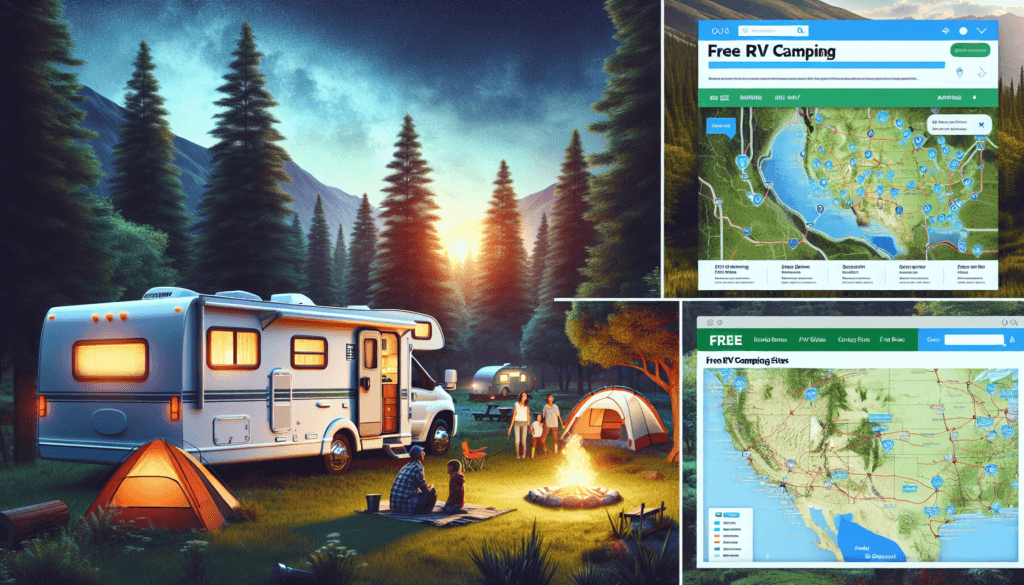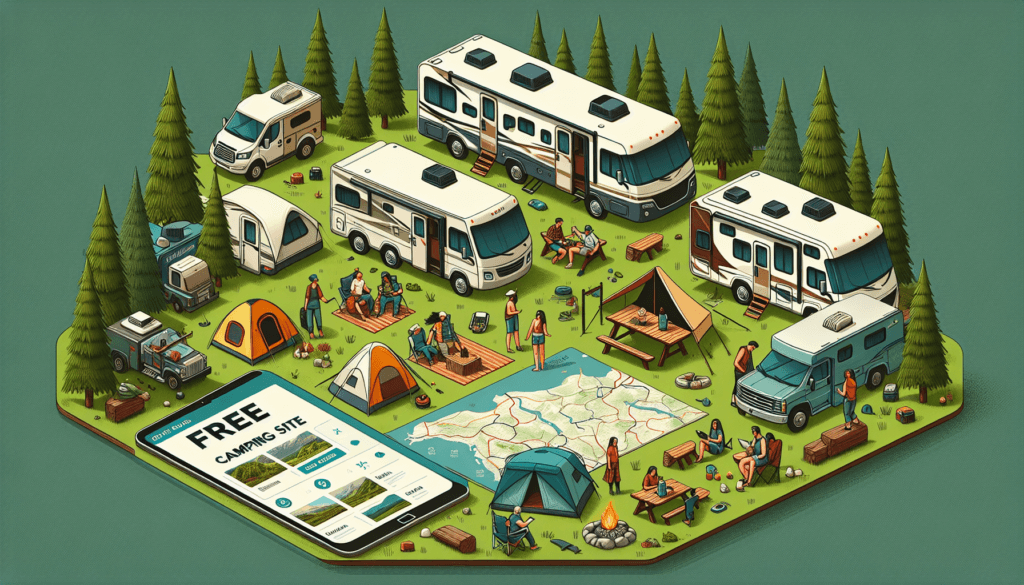Imagine embarking on an epic RV adventure, exploring breathtaking landscapes and immersing yourself in the beauty of nature, all without spending a fortune on camping fees. In this article, we unveil the secrets of finding free RV camping sites, allowing you to experience the joy of the open road while keeping your wallet happy. From national forests to public lands, discover the hidden gems that offer stunning views and an unforgettable camping experience without breaking the bank. Get ready to plan your next RV getaway and unlock the world of cost-free camping.

Plan Ahead
Planning ahead is crucial when it comes to finding free RV camping sites. The first step is to research different camping options. This includes looking into national parks, public lands, and other types of free camping areas. By understanding what options are available, you can make an informed decision on where to go.
Another important aspect of planning ahead is checking campground regulations and restrictions. Different areas may have specific rules when it comes to RV camping. Some may only allow certain types of vehicles, while others may have restrictions on the length of stay. By familiarizing yourself with these regulations, you can ensure a smooth and hassle-free camping experience.
Utilize Online Resources
The internet is a treasure trove of information when it comes to finding free RV camping sites. One of the first things you should do is visit government websites. Most national parks and public lands have their own websites where you can find information on camping options, regulations, and any fees that may be involved. These websites are a reliable source of information and can help you narrow down your camping choices.
In addition to government websites, camping forums and online communities are another valuable resource to tap into. These platforms allow RV enthusiasts to share their experiences, recommendations, and tips on finding free camping sites. By engaging with these communities, you can learn from others who have already explored different camping areas and can provide valuable insights.
Use Camping Apps and Websites
When it comes to finding free RV camping sites, there are now numerous camping apps and websites available that can assist you in your search. Downloading camping apps on your smartphone can help you easily locate nearby camping areas, filter them based on your preferences, and even provide reviews and ratings from other campers. Some popular camping apps include RV Parky, The Dyrt, and Campendium.
Furthermore, exploring websites dedicated to free camping can greatly expand your options. These websites often have comprehensive databases of camping sites, including those that are free or have minimal fees. Some examples of these websites include freecampsites.net, boondocking.org, and campsitephotos.com. These platforms can be incredibly helpful in finding hidden gems and lesser-known camping spots.
Join RV Clubs or Associations
Another excellent way to find free RV camping sites is to become a member of RV clubs or associations. These organizations often offer exclusive benefits and discounts to their members, including access to free or discounted camping sites. By joining these clubs, you not only gain access to a network of fellow RV enthusiasts but also gain insider knowledge on the best camping spots.
Attending RV associations’ events and gatherings is also a great way to discover new camping areas. These events often bring together seasoned RVers who are willing to share their knowledge and experiences. By participating in these gatherings, you can learn about free camping options that may not be widely known.

Utilize Social Media
In today’s digital age, social media has become a valuable tool for finding information on nearly any topic, including free RV camping sites. Joining online RV camping groups and pages can connect you with a community of like-minded individuals who are passionate about RVing and can provide recommendations and suggestions for free camping spots.
Additionally, following social media accounts related to camping can keep you informed about the latest camping trends and news. Many national parks and public lands have their own social media accounts where they frequently share updates on camping availability, special events, and other important information. By staying connected through social media, you can stay up to date with the latest opportunities for free RV camping.
Explore Public Lands
Public lands offer a wealth of free RV camping opportunities. One type of public land to explore is the Bureau of Land Management (BLM) areas. These areas often have designated camping spots where RVs are welcome at no cost or for a minimal fee. BLM lands are typically vast and offer beautiful natural landscapes, making them ideal for RVers who enjoy solitude and outdoor adventures.
Another option is to discover national forests and grasslands. These areas often provide dispersed camping, which means you can set up your RV in a designated area of the forest or grassland. Dispersed camping usually does not require reservations and is free of charge, making it an attractive option for budget-minded RVers. However, it is important to follow any regulations and leave no trace to maintain the ecological integrity of these areas.

Check Out National Parks
While national parks are known for their stunning natural beauty, they may not always be associated with free camping. However, some national parks do offer free or low-cost camping options. It may require some research and planning to find these opportunities, but the rewards can be well worth it.
When researching national parks, look for information on dispersed camping or backcountry camping areas. These areas often allow RVs and provide the opportunity to camp in more remote and secluded locations within the park. Keep in mind that these camping options may have limited amenities or require a permit, so it’s important to plan accordingly.
Stay at Walmart, Casinos, or Truck Stops
If you’re in need of an overnight stop, consider parking at Walmart, casinos, or truck stops. Many Walmart stores across the country allow overnight RV parking as long as you follow their guidelines. This can be a convenient option, especially if you’re looking for a quick and easy stop along your route.
Similarly, some casinos and truck stops have RV-friendly policies and offer designated areas for overnight parking. While these options may not provide the same level of natural beauty as camping in a national park or public land, they can be a practical and cost-effective solution when you’re in need of a place to rest for the night.

Contact Local Authorities
Local authorities, such as tourism and visitor centers, can be a valuable resource when it comes to finding free RV camping sites. These organizations are often knowledgeable about the local area and can provide recommendations on nearby camping options. They may even have maps or brochures that highlight free camping areas, making it easier for you to plan your trip.
Additionally, reaching out to local law enforcement or park rangers can provide valuable insights and recommendations. These individuals are often familiar with the area and may have insider knowledge on hidden camping spots that aren’t widely known. Don’t hesitate to ask for their advice and guidance when planning your RV camping adventure.
Be Mindful of Boondocking
Boondocking, also known as dry camping or off-grid camping, is a popular option for RVers seeking a more adventurous and self-sufficient camping experience. However, it is important to understand and abide by boondocking regulations to ensure the sustainability of these camping areas.
Different areas may have specific rules regarding boondocking, such as the maximum length of stay or requirements for waste disposal. It is crucial to research and understand these regulations before setting up camp. Additionally, practicing responsible boondocking, which includes minimizing your impact on the environment and respecting the privacy of others, is essential for preserving these precious camping opportunities for future generations.
In conclusion, finding free RV camping sites requires careful planning and utilizing various resources. By researching different options, utilizing online resources and apps, joining RV clubs or associations, exploring public lands and national parks, and staying connected through social media, you can discover hidden gems and budget-friendly camping spots. Remember to always be mindful of regulations, practice responsible camping, and enjoy the freedom and adventure that RV camping has to offer. Happy camping!



